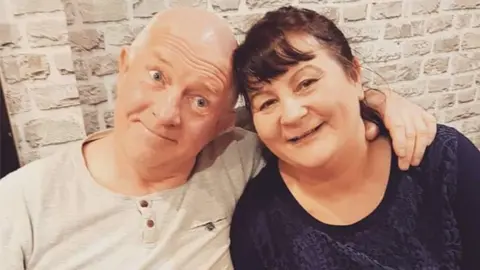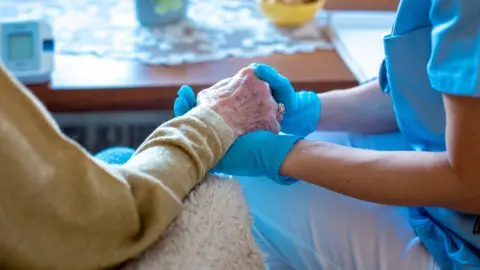Carer shortage leaves Greysteel woman 'stuck in hospital'
 Devine family
Devine familyA woman with Alzheimer's has been left stranded in hospital because of a lack of carers to help look after her at home, her husband says.
Brenda Devine, 57, from Greysteel, County Londonderry, was admitted to the Waterside Hospital seven months ago.
Her family said she had been told she was ready to go home, but could not leave due to a shortage of carers.
Her husband Terence said it felt like his wife was "in a prison and I can't get her out".
"She has been released but I can't get her home," he told BBC Radio Foyle.
A Department of Health (DoH) spokeswoman said demand for home-based care currently "outstrips supply".
"There is immediate work to be done given the crisis that we find ourselves in, but there is clearly also a need to address issues in the long term," she said.
A number of measures are in place or planned to help address the current shortage, she added.
That includes asking health trusts to waive the usual care home fees where domiciliary care packages are not available but a care home placement is.
The Western Health and Social Care Trust said it did not comment on individual cases.
'Up against a brick wall'
Mr Devine said his wife was first admitted to Altnagelvin Hospital on 16 April after suffering severe abdominal pain at home.
She was transferred to the Waterside Hospital, where social workers carried out a care package assessment.
 Devine family
Devine familyCare packages are required by elderly, disabled or vulnerable people who need help with washing, dressing or cooking, or who need adaptations to their home.
The assessment determined Brenda could leave hospital and be cared for at home with the help of professional carers, Mr Devine said.
But that has not happened.
"This is going on and on," Mr Devine said.
"I am up against a brick wall with nowhere to turn. I thought Brenda would have been home months ago, every week is precious to me and to the family.
"The social workers have said there are no carers. The social workers, the hospital and the nurses have been doing a fantastic job, but there is no communication (with the trust)."
 Getty Images/Sanja Radin
Getty Images/Sanja RadinHe said it was a "guessing game" as to when his wife might return home.
Due to Covid-19 visiting restrictions, visiting has been limited too.
Mrs Devine has not seen her son, granddaughter or wider family since she was first admitted to hospital.
Mr Devine said the situation was "soul-destroying... heartbreaking for the whole family".
"When Brenda was here, my mind was full. I enjoyed helping her, if it was the other way around she would do anything for me," he said.
"The hospital at the minute is not the place for her, and we have a home for her."
In August, figures from each of Northern Ireland's health trusts showed almost 2,000 people were waiting for care packages, mainly so they could be supported to live in their own homes.
The latest figures from the Department of Health show that as of October the number of people waiting for a care package, many of whom are in care homes, has dropped to 1,657.
That includes:
- 410 people - Belfast Health Trust
- 402 people - Northern Health Trust
- 280 people - Southern Health Trust
- 424 people - Southern Eastern Health Trust
- 141 people - Western Health Trust
BBC News NI understands that many front-line care staff feel the number waiting on care packages could be much higher.
'Sadly not an isolated case'
Bernadine McCrory, operations director of the Alzheimer's Society, said Brenda's situation was not an isolated case.
"We have had reports [of shortage of carers] from all of the trusts so this is across all of Northern Ireland," Ms McCrory told BBC Radio Foyle.
She said cases like Mrs Devine's should be addressed urgently.
"While she may be in a hospital ward, she is socially isolated from her family as she can only see her husband and her daughter," she said.
"We really have got to start thinking of the value of the family carers because they are saving our health service thousands a week, but we aren't getting investment in the system to allow family carers to continue to do this."
 Getty Images/shapecharge
Getty Images/shapechargeThe Department of Health said a range of measures had been taken to try and address the shortage of carers in Northern Ireland.
That includes ongoing recruitment drives and the establishment of a social care forum. A publicity campaign promoting social care as a career is also planned.
"Whilst these have been successful in recruiting new workers, this has not been in the numbers required to address the increasing demand," the spokeswoman said.
How care at home will be provided in the longer term, the spokeswoman said, will be shaped by the work of the Reform of Adult Social Care.
